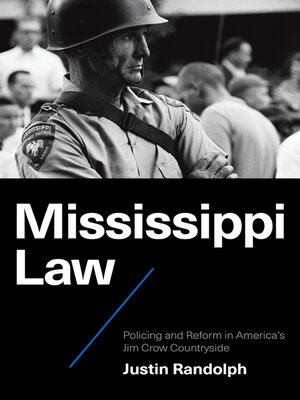Mississippi Law
ebook ∣ Policing and Reform in America's Jim Crow Countryside · Justice, Power, and Politics
By Justin Randolph

Sign up to save your library
With an OverDrive account, you can save your favorite libraries for at-a-glance information about availability. Find out more about OverDrive accounts.
Find this title in Libby, the library reading app by OverDrive.



Search for a digital library with this title
Title found at these libraries:
| Library Name | Distance |
|---|---|
| Loading... |
In the segregated American South, policing was war. Rampant police violence came to the back roads and cattle pastures of America’s rural countryside as ideas of race, property, and belonging reshaped the role of government in everyday life. In Mississippi Law, Justin Randolph explores rural law enforcement to explain US racial authoritarianism between the Civil War and the civil rights movement. In Jim Crow Mississippi, the force behind the police officer’s autocracy carried legacies of empire and slavery into the age of agribusiness and automobiles—from state troops and slave patrols to state troopers and highway patrols. But this is no isolated story of individual barbarism. US military and reform traditions informed ruling-class beliefs in thoughtful police improvement through both the state militia and its inheritor, the state police.
Black Mississippians fought to raise awareness and defend their loved ones against the violence spawned by paramilitary police reform. Some took up arms against police officers; others imagined a legal off-ramp to remake public safety after Jim Crow. Ultimately, the transformation of what one activist called “Mississippi Law” came with more funding and more authority for policing, a key piece of infrastructure for the age of mass incarceration that followed the civil rights revolution. Recounting the works of both famous and forgotten activists, Mississippi Law is a genealogy of Jim Crow rule and dreams of a safety that might have been and might yet be.
Black Mississippians fought to raise awareness and defend their loved ones against the violence spawned by paramilitary police reform. Some took up arms against police officers; others imagined a legal off-ramp to remake public safety after Jim Crow. Ultimately, the transformation of what one activist called “Mississippi Law” came with more funding and more authority for policing, a key piece of infrastructure for the age of mass incarceration that followed the civil rights revolution. Recounting the works of both famous and forgotten activists, Mississippi Law is a genealogy of Jim Crow rule and dreams of a safety that might have been and might yet be.







